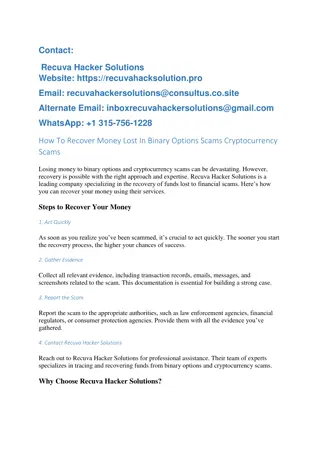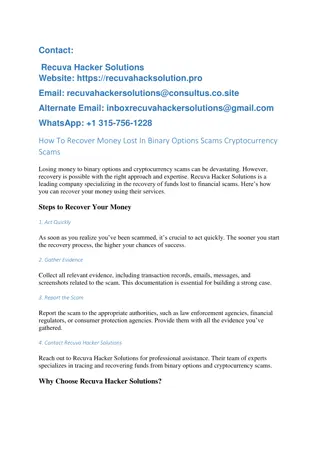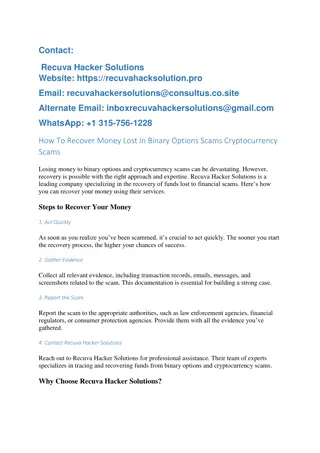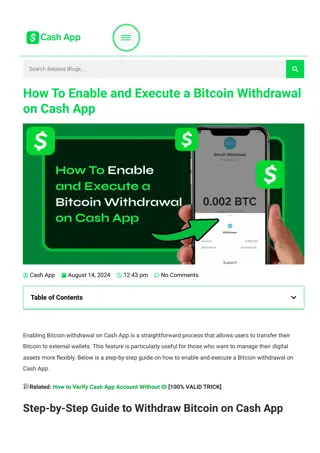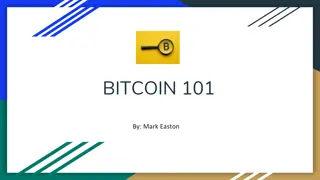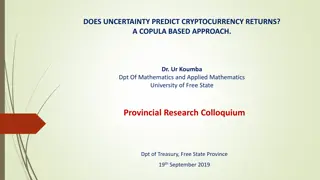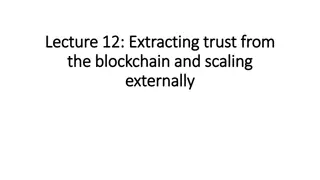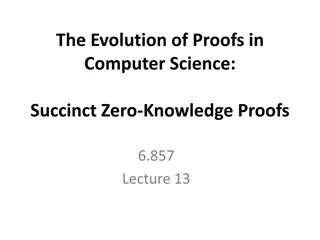Evolution of Bitcoin: A Brief History and Overview
Explore the evolution of Bitcoin from its origins with Satoshi Nakamoto in 2009 to becoming the most widely-used digital currency in the world. Learn about its decentralized nature, P2P network, market cap, exchange rate volatility, and how it is utilized across various platforms and businesses.
Download Presentation

Please find below an Image/Link to download the presentation.
The content on the website is provided AS IS for your information and personal use only. It may not be sold, licensed, or shared on other websites without obtaining consent from the author.If you encounter any issues during the download, it is possible that the publisher has removed the file from their server.
You are allowed to download the files provided on this website for personal or commercial use, subject to the condition that they are used lawfully. All files are the property of their respective owners.
The content on the website is provided AS IS for your information and personal use only. It may not be sold, licensed, or shared on other websites without obtaining consent from the author.
E N D
Presentation Transcript
BITCOIN 2014 John Black Spring 2014
Digital Currency Chaum s ideas in the 1980 s All ideas required a central bank or single point of trust Chaum started a company DigiCash in 1990 Bankrupt in 1998 Lots of other companies you ve never heard of have attempted digital cash
Enter Bitcoin Developed by Satoshi Nakamoto in 2009 A pseudonym No one knows who this guy actually is And it s apparently not this guy:
Bitcoin devs Nakamoto has apparently bowed out Bitcoin was taken over by open-source devs Still going strong
Bitcoin Overview The most widely-used digital currency in the world About $6B market cap at current exchange rates About 12M bitcoins in existence Current exchange rate is about $500/coin Completely P2P No central authority The P2P networking piece is fascinating, but we won t talk about it Often called a cryptocurrency Uses hash functions (primarily SHA-256 and RIPEMD160) Uses digital signatures (RSA)
Why Bitcoin? Novel Not tied to any authority or jurisdiction What is money anyway? Demand creates value Anonymous It s not, actually No regulation Good or bad? This will change soon, I m guessing
How its used Various exchanges Mt Gox was the largest, but recently shutdown Cool people/places accept it Virgin Galactic accepts Bitcoin Reddit, Zynga, OKCupid, Domino s Pizza Shady places accept it Silkroad Pirate Bay
Where do Bitcoins come from? Fifty coins generated in the Genesis Block More are generated with each transaction Whoever verifies a transaction first gets a reward Generating these rewards is called mining The first reward amounts were 50 BTC The reward halves every 210,000 validated transactions Roughly once every four years, so it s happened once so far; current reward is 25 BTC ($12,500) The smallest unit of Bitcoins is a satoshi , which is 10-8BTC In 2140 CE, the reward will fall below 1 satoshi and therefore no further Bitcoins will be created There will be 21 million BTC then; that s the end
Transaction Fees Verifying transaction is (purposely) hard That s why you get so much money for doing it! There are also transaction fees paid to the verifier These have normally been set to 0 since the reward for mining is already pretty good Lately the fees have risen to provide an added incentive The fees are taken from the payer as a tax In 2140 CE, transaction fees will be the only incentive remaining
How does Bitcoin actually work? You start by installing a wallet program
Bitcoin Address To receive money, you tell your wallet to generate an address This causes the wallet to generate a public-key/secret- key pair The public key is hashed and published as your address Why is it hashed? No good reason, really You publish your address Or just tell the payer your address Why no CA to bind address to your identity?
Receiving Money Suppose I want to pay you 1 BTC I need your address You generated it as in the previous slide I generate a transaction record and sign it Contains the amount, some metainfo, and your address Also has hash of previous transaction that granted me the money I m using Signed by my secret key If I lose the secret key associated to the transaction that granted me the bitcoins I m sending you, I lose that money!
Transaction Record 1. {"hash":"7c4025...", hash of all following 2. "ver":1, 3. "vin_sz":1, 4. "vout_sz":1, 5. "lock_time":0, 6. "size":224, 7. "in":[ 8. {"prev_out": 9. {"hash":"2007ae...", hash of previous transaction 10. "n":0}, 11. "scriptSig":"304502... 042b2d..."}], 12. "out":[ 13. {"value":"0.31900000", 0.319 BTC being sent 14. "scriptPubKey":"OP_DUP OP_HASH160 a7db6f OP_EQUALVERIFY OP_CHECKSIG"}]} a7db6f is intended recipient
Verifying Transactions Why not just check to see if I properly signed the transaction record? I could be cheating! Maybe I don t own the coins I m sending Maybe I already spent those coins with someone else So instead the bitcoin network verifies the transaction This is hard-by-design because there is a nice payoff for doing it It also means a cheater would have to have more computing power than the rest of the network
The Blockchain Every verifier (or miner ) on the network has an entire history of all transactions Called the blockchain This is a chain of transactions that tracks where each bitcoin has been Every transaction has the hash of the previous transaction that granted the coins Once a transaction has been verified, it is added to the blockchain by all nodes of the network
How to Mine Bitcoins Suppose you want to verify a transaction Suppose the transaction is hello Compute SHA256( hello:0 ) a61bb398117fe Compute SHA256( hello:1 ) 61b7a90017562 Compute SHA256( hello:917712 ) 0000718a5dce3 winner!
How hard is this? To get a leading 0 digit in hex, assuming SHA256 is random 1/16 chance 16 expected trials Two leading 0 s 256 expected trials In reality, to verify a bitcoin transaction you have to get below the target This should take about 10 mins given the power of the network This is recalibrated every 2 weeks
Current Exp # Hashes for Target For the current target we need about 264.8975 hashes to get below the target This can be parallelized of course Full scaling when parallelized Great use of botnets! Believe me, people have studied the economics of how much power is worth exerting to get rewards
Announcing Verification Once an entity verifies the transaction it broadcasts it to the network The other nodes stop trying to compete Because they already lost Other nodes verify that the transaction is valid Money spent was legitimately owned Verifier got below the target Then transaction is added to the end of the blockchain Blockchain cannot fork Details omitted


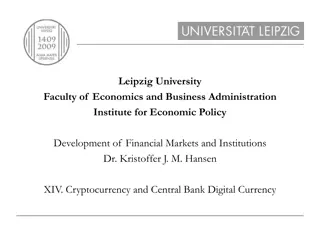


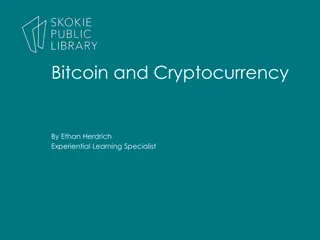
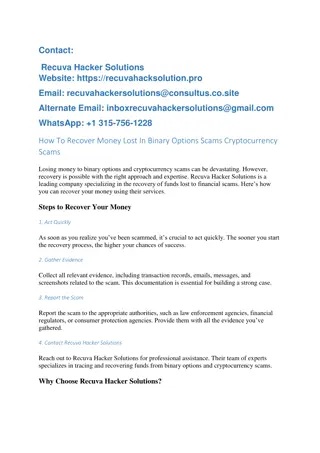
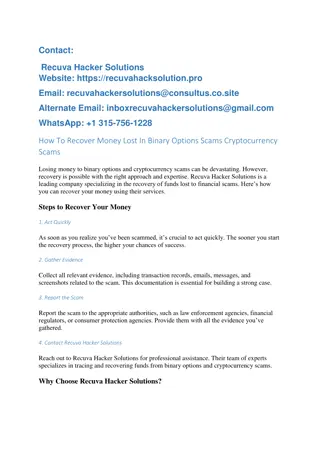
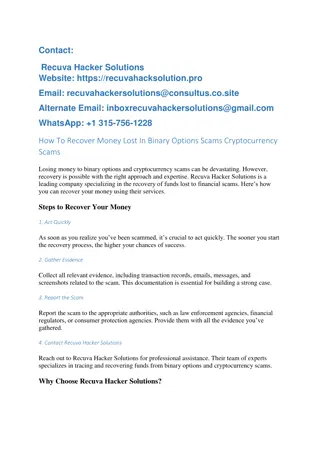
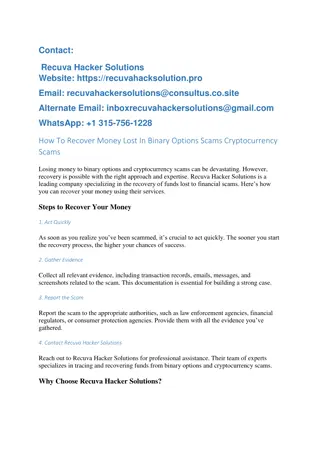
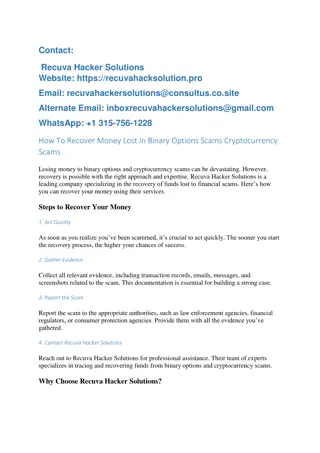
![101 Reviews How to Recover Lost Bitcoin [Scammed/Stolen Funds]](/thumb/153354/101-reviews-how-to-recover-lost-bitcoin-scammed-stolen-funds.jpg)
